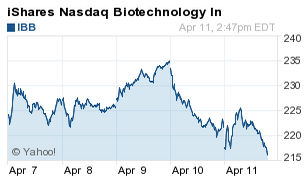Some analysts feel that the biotech sector's recent tumble is evidence of the biotech bubble bursting.

But they're wrong; the market is simply in a period of adjustment.
The premise behind the bubble idea is that biotech companies as a group are overvalued, that their market caps aren't supported by performance. In other words, that their perceived value is all smoke and mirrors.
The problem with that argument is, these analysts are using a mass of technical indicators to support it. Anyone who's followed start-up biotechs knows that's a fool's errand.
Why?
Because most of these companies won't turn a profit for years, and no one expects them to. Their job in the startup phase is R&D, not market performance. The only really meaningful financial indicator of a young biotech's health is its negative cash flow - how fast is it burning through money, and does it have enough cash reserves to keep the lights on for a year or two?
The fact is, a pre-profit biotech's valuation is based solely on our expectations for its future performance. And we form those expectations on the quality of the drugs or devices it is developing insofar as they help safely cure or manage disease or injury.
A bubble happens when speculators put a lot of money into assets that have no fundamental value. Like the dot-coms - anyone could put together a website and open an office with a chair, a desk, and a computer, and people would invest their hard-earned money into it. How about real estate? The properties were real, of course, but the instruments used to finance them, the mortgages, were fundamentally flawed.
That is not the case for bioscience companies. These firms develop and hold important intellectual properties that have real value. Some will succeed, and many will fail. But they will do so individually, not as part of some overall momentum in the sector.
There is no bubble. Not all boats are rising. It's true that the sector, on average, had a remarkable growth year in 2013, but that's because a select group of biotechs had super-success, even while others floundered, and their numbers inflated the mean.
So if it's not a biotech bubble bursting, what's going on in the sector? Why have stocks been moving downward over the past couple weeks?
Here's the Real Deal with Biotech Stocks
What's happening is investors have gotten nervous. They're not sure of the high valuations they have assigned to these young companies. They're questioning their own judgment. And in a moment of somewhat panicky behavior, they're selling their uncertainty.
But in doing that, they arbitrarily push valuations lower, which makes it more difficult for the biotechs to raise new money as needed. Notice that it's almost always after a rapid rise in stock price that a biotech will open up a public offering of stock. Why? The increased value of the shares will help offset the dilutive effects of the offering, so the shares will be easier to sell. Very often, the price dilution disappears within a few days.
Eventually, the market will wake up and come to realize that high valuation is healthy for the bioscience sector, that it sustains research and brings exciting new medicines to patients who need them. And the current trend will reverse direction powerfully.
Check out bioscience expert Ernie Tremblay's latest Money Morning column - and get his pick for a biotech stock that could double in the next year: One Stock, 18 Ways to Make Big Money
About the Author
Ernie Tremblay has more than 25 years of experience in following and analyzing the latest developments in health, medicine, and related technologies. He understands the FDA approval process, as well as the "hard science" behind new, experimental drugs and the market demand for them - and has a comprehensive grasp of the complex dynamics that determine whether a new drug will be a breakthrough winner, or just another casualty of the FDA approval process.



